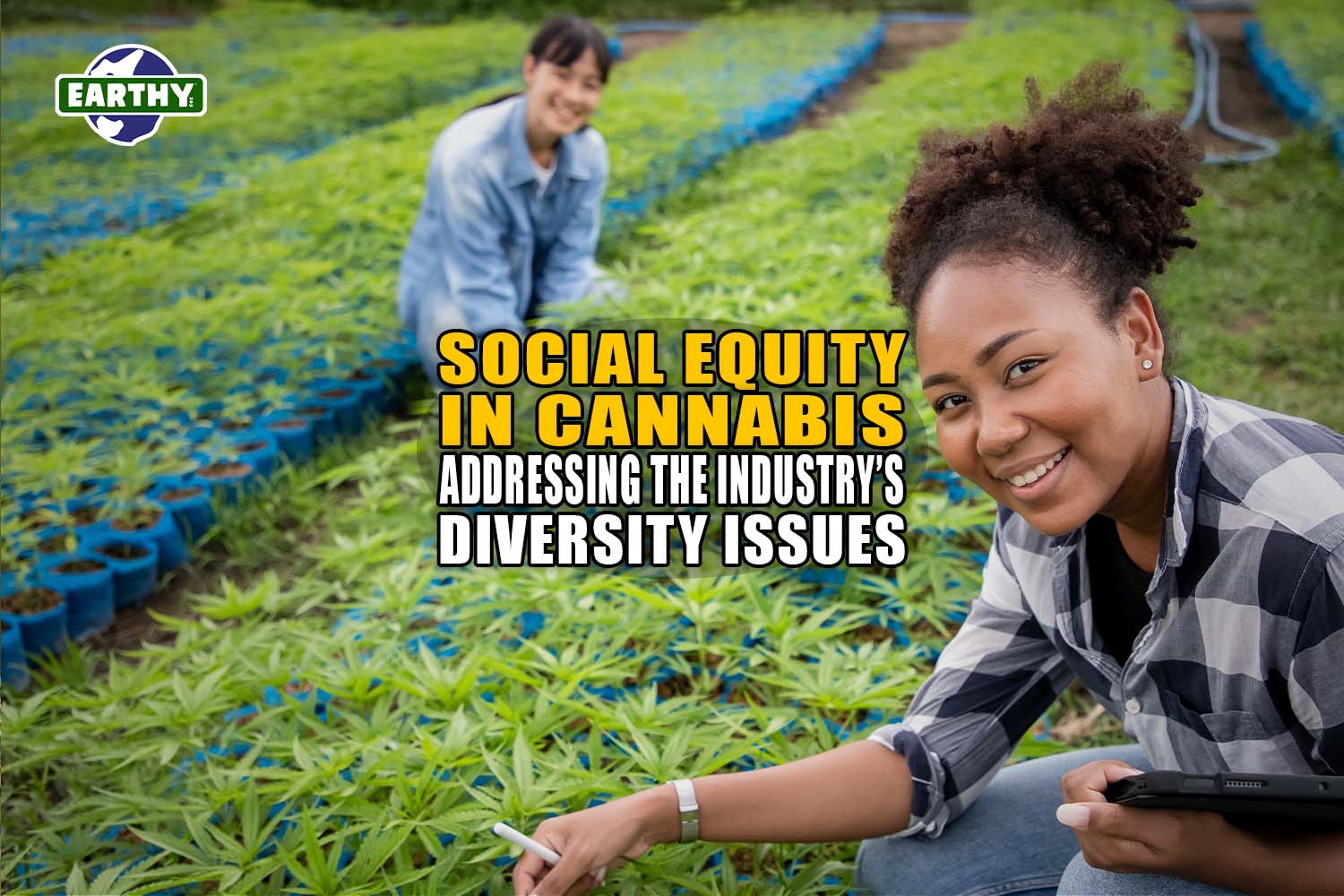The cannabis industry has become one of the most lucrative sectors in the modern economy [1]. As legalization spreads across states, it brings to light the importance of equity in cannabis. Ensuring diversity and inclusion within this burgeoning market is not just a matter of social justice but also of economic development. This article aims to address the current diversity issues within the cannabis industry, the historical context that has led to these challenges, and the ongoing efforts to promote social equity.
Historical context
The history of cannabis prohibition has left a devastating impact on marginalized communities. For example, the War on Drugs, initiated in the 1970s, led to the widespread criminalization of cannabis, resulting in disparate enforcement that disproportionately harmed people of color. Additionally, the criminal justice system’s focus on drugs meant that communities of color faced higher arrest rates and longer sentences for cannabis-related offenses, affecting families and entire neighborhoods. Now, as cannabis regulation shifts towards legalization, lawmakers need to address these historical injustices and promote equity within the legal cannabis industry [2].
A Brief Legal History of Hemp: Prohibition and Racism
The current state of diversity in the cannabis industry
Despite the rapid growth of the cannabis industry, diversity remains a significant issue. Indeed, the demographic makeup of cannabis business owners and employees does not reflect the broader population. Unfortunately, barriers to entry, such as financial obstacles and complex regulatory requirements, disproportionately impact communities that were most affected by cannabis criminalization. Moreover, cannabis social equity applicants often struggle to secure the necessary funding and technical assistance to start their businesses, resulting in a lack of representation among equity licensees [3].
High Impact: How Cannabis Activists Are Changing the Legal Landscape
Challenges in achieving social equity in cannabis
Achieving social equity in the cannabis industry involves overcoming several challenges:
- Financial barriers: Social equity applicants often find that access to capital poses a significant hurdle. In other words, many lack the financial resources to cover the high costs associated with starting a cannabis business.
- Legal and regulatory hurdles: Cannabis regulation varies across states and local jurisdictions, creating a complex landscape for equity applicants to navigate. The licensing processes can also be particularly daunting.
- Social stigma: Despite legalization, there remains a social stigma associated with cannabis use and business, which can deter participation from marginalized communities.
- Lack of education and resources: Many potential equity licensees lack access to the necessary business education and technical assistance to succeed in the cannabis industry [4].
Efforts to address diversity issues
Initiatives implemented regarding social equity in cannabis:
- Social equity programs: Many states and cities have established social equity programs to support communities disproportionately impacted by the War on Drugs. These programs aim to provide social equity applicants with technical assistance, grant funding, and other resources.
- Workforce development programs: Some jurisdictions offer workforce development programs to train individuals from impacted communities for jobs in the cannabis industry. As a result, these programs promote economic development and provide career opportunities.
- Private sector initiatives: Cannabis companies and industry organizations have taken steps to promote diversity. Notably, these efforts include mentorship programs, funding initiatives, and partnerships with community groups committed to social equity [4].
A Comprehensive Guide to Unlocking the Potential of Wholesale Hemp Flower
Policy recommendations
To further promote social equity in the cannabis industry, many proponents suggest several policy recommendations:
- Increasing funding and resources: Governments and private sectors could increase grant funding and resources for social equity programs. As a result, this support could help cover startup costs and provide ongoing business development assistance.
- Improving access to education and training: Providing comprehensive business education and technical assistance to equity applicants can equip them with the skills needed to succeed.
- Reforming licensing processes: Simplifying and streamlining licensing processes can help social equity applicants navigate the regulatory landscape more easily.
- Encouraging public-private partnerships: Collaborations between public agencies and private businesses can enhance the effectiveness of social equity programs and ensure broader participation [5].
3 Surprisingly Useful Hemp Products
The role of community and advocacy
Community involvement and advocacy are crucial in advancing social equity in the cannabis industry:
This involvement includes:
- Grassroots efforts: Local community groups and activists play a vital role in pushing for equitable policies and holding governments accountable.
- Advocacy groups: Organizations dedicated to social justice and equity are instrumental in advocating for policy changes and providing support to social equity applicants.
- Alliances with other movements: Building alliances with other social justice movements can amplify efforts to achieve equity in cannabis and address broader issues of systemic inequality [6].
Unveiling the Secret of Earthy Now’s Success in the Hemp World
Source your cannabis products from equitable brands like Earthy Now
For cannabis enthusiasts seeking reliable, artisanal cannabis flower and other hemp-derived products, Earthy Now has something for everyone. These products are the industry’s cleanest and strongest, with only trace amounts of Delta-9 THC. Moreover, Earthy Now is committed to contributing to social equity programs for a more inclusive and vibrant industry.
Explore these natural, organic products from Earthy Now:
- CBD Flower
- Gummies
- Lozenges
- Tablets (THC Free!)
- Soothing Relief Lotion
- Soothing Relief Salve
- CBD Pet Tinctures (no THC!)
- Oils
- Pre-Rolls
- Smokes
- Terpenes
3 Reasons Why Your Small Business Should Consider CBD Products
Future outlook
The future of diversity in the cannabis industry depends on the continued commitment to social equity.
- Predictions: With ongoing efforts and improvements in social equity programs, the cannabis industry could see a more diverse and inclusive landscape in the coming years.
- Long-term impacts: Successful social equity initiatives can have profound long-term impacts. For instance, these programs can foster economic empowerment and rebuild communities disproportionately harmed by cannabis criminalization.
- Continued vigilance: Ensuring sustained progress requires ongoing advocacy, policy refinement, and active participation from all stakeholders [7].
From Anxiety to Wellness: The Impact of CBD Oil on Pet Behavior
Key takeaway: social equity in cannabis requires continued efforts
Achieving social equity in the cannabis industry is both a challenge and an opportunity. However, by addressing the historical injustices of cannabis prohibition and implementing robust social equity programs, this movement can create a more inclusive industry. Indeed, the commitment of governments, businesses, and communities to promoting equity ensures that a more diverse population can share the benefits of the legal cannabis industry. As we move forward, we must remain vigilant and continue advocating for policies and practices that support social equity and justice.
Ultimately, by fostering a more equitable industry, we can not only right the wrongs of the past but also pave the way for a more just and prosperous future for all communities.
Visit Earthy Now and discover premium, organic hemp products for every preference!
Medical Disclaimer / Legal Disclaimer – Information is provided for educational purposes. It does not and is not intended to constitute legal advice or medical advice. We attempt to be accurate and up-to-date, but the legality of cannabinoids and the science of cannabis are evolving. The author is neither a legal professional nor a medical expert. Before buying or using any products, you should check with your local authorities and medical providers.
References
- Marijuana Industry Statistics
- Marijuana’s Racist History Shows the Need for Comprehensive Drug Reform
- The Cannabis Industry Still Lacks Diversity
- The Complete Guide to Social Equity Programs for Dispensaries
- Recommendations for Fair and Equitable Cannabis Policy
- 5 Organizations Fighting for Social Equity in Cannabis
- Leveling the Playing Field: Understanding the Importance of Social Equity in the Cannabis Industry
- The Critical Importance Of Social Equity In The Cannabis Industry




 Earthy Now
Earthy Now Earthy Now
Earthy Now